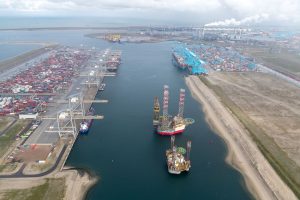
The Port of Rotterdam recorded a 0,1% increase in its 2019 throughput reaching 469.4 million tonnes, compared to 2018 (469 million tonnes).
Significant underlying shifts were observable between the various commodities. LGN recorded the higher increase (36,6%), followed by other liquid bulk (10.7%), crude oil, with 3.9% and containers, by 2.5%. The increase in LGN throughput was mainly due to the import of a greater proportion of the gas produced around the Atlantic Ocean into Europe, instead of being exported to Asia. The increase in other liquid bulk is accounted for by the import and export of biofuels, particularly biodiesel.
Total throughput of liquid bulk in 2019 (211.2 million tonnes) was almost the same as in 2018 (211.8 million tonnes).
The TEU increased by 2.1%, and the annual total was 14.8 million TEUs. Following a good start in the first six months of 2019, growth in container transshipment was almost negligible during the second six months of the year. Container throughput measured in tonnes grew by 2.5%.
Coal and mineral oil product throughputs decreased by 14.8% and 12.2% respectively. The share of coal in Dutch and German power generation has decreased significantly as both countries are generating more power from solar, wind and gas. Throughput of coking coal also came under pressure as a consequence of declining steel production in Germany.
Over the past year significant progress has been made with digitisation and the energy transition, in particular through the launch of PortXchange, the proposed expansion of the heat supply network, and the agreement between the Port Authority and various companies to work towards the capture, transport and storage of CO₂.
“The success of a modern port cannot be measured by throughput tonnage alone. Our customers no longer just want increased throughput capacity, but demand a better, faster and, above all, smarter port. Equally crucial for the future is that industry succeeds in accelerating the energy transition so that the Port of Rotterdam can make a real impact towards achieving the Dutch climate objectives,” Allard Castelein, the Port of Rotterdam Authority CEO said.
The Investments by the Port of Rotterdam Authority were again at a high level, with gross investments including participations amounting to EUR 338.3 million (2018: EUR 408.1 million). Major investment projects included the construction of the Container Exchange Route (CER) on Maasvlakte, the rerouting of part of the Port Rail line via the Theemsweg route, and the construction of new quay walls for the Hartel Tank Terminal.
Share on:



